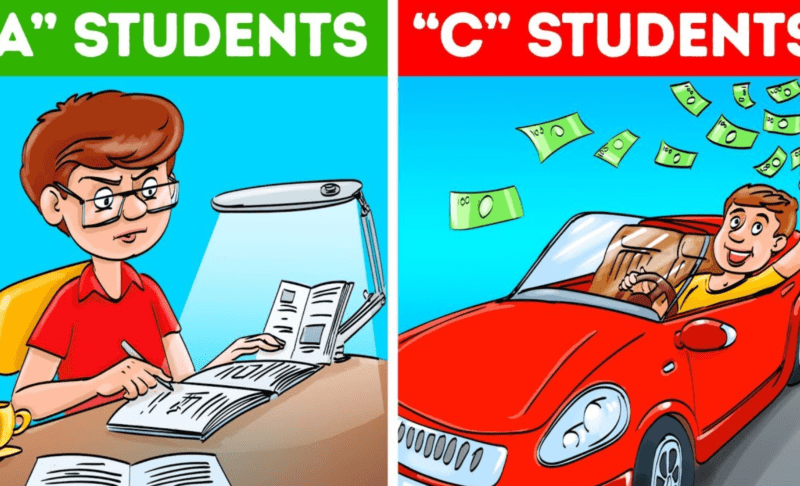“Rich Dad Poor Dad” by Robert Kiyosaki popularized the idea that ‘A’ students work for ‘C’ students, sparking debates and misconceptions about academic performance and real-world success. While there is some truth to this idea, it’s important to understand the nuances and recognize that success depends on a combination of personal attributes and circumstances. This blog will delve into the elements contributing to success and explore why some ‘C’ students might excel in the entrepreneurial world while ‘A’ students thrive in structured environments.
The Truth Behind the Statement
First and foremost, success is influenced by individual behavior, goals, and circumstances. It’s not solely determined by academic grades. Let’s explore this concept through some real-life examples.
The Cristiano Ronaldo Interview
Consider Cristiano Ronaldo, one of the greatest football players of all time. In an interview, when asked about his favorite subject in school, he appeared awkward and unsure. This moment underscores a critical point: if Ronaldo had focused solely on academics, the world might have missed out on his extraordinary talent in football. This highlights that success in life is multifaceted and not confined to academic achievements.
Elements of Success
Everyone’s success is determined by several factors, which include:
- Personality: A positive attitude, the ability to inspire others, and contributing positively to people’s lives are essential traits. Successful individuals often possess a charismatic personality that attracts opportunities and support.
- Physicality: Good health, energy, and an attractive demeanor can play a significant role in one’s success. While not as critical as other factors, physical presence can influence how individuals are perceived and their ability to seize opportunities.
- Intelligence: Intelligence, particularly verbal ability, is crucial. However, practical intelligence, such as problem-solving skills and the ability to think on one’s feet, often outweighs theoretical knowledge in real-world scenarios.
- Reputation: A strong track record and the ability to achieve or contribute significantly to work or projects build a reputable persona that opens doors to new opportunities.
- Luck: Sometimes, being in the right place at the right time can significantly impact success. Luck can play a role in job selection and career advancements.
Real-Life Examples of 'C' Student Success

- Richard Branson: The founder of the Virgin Group struggled with dyslexia and performed poorly in school. However, his creativity, risk-taking ability, and entrepreneurial spirit led him to create a global brand spanning various industries.
- Steve Jobs: The co-founder of Apple Inc. was known for his rebellious nature and dropped out of college. Jobs’ vision, creativity, and willingness to take risks revolutionized technology and changed the world.
- Elon Musk: Although Musk was a good student, his success came from his innovative thinking and relentless pursuit of his goals. He took significant risks with companies like Tesla and SpaceX, ventures that many would consider too risky.
A Tale of Two Friends
Consider two friends who passed school together—one from a poor background and the other from a middle-class family. The poor friend couldn’t afford higher education and started working early, gaining practical experience. The middle-class friend pursued higher education, secured a job, and climbed the corporate ladder. Years later, the poor friend, having started a small business, became a successful entrepreneur. When they met again, the middle-class friend, now seeking a job at his friend’s company, realized that practical experience and risk-taking had led to significant success for the once poor friend.
Lessons from the Story
This story teaches us that practical experience and the ability to take calculated risks can create wealth and success. A degree can be valuable, but it’s not the sole determinant of success.
The Roles of 'A', 'B', and 'C' Students

- ‘A’ Students: Often meticulous planners, ‘A’ students excel in structured environments where they can follow clear guidelines and achieve predictable outcomes. They tend to seek stable employment and avoid risks.
- ‘B’ Students: These individuals balance ambition with a more relaxed approach. They might settle for “good enough” positions that offer stability but do not push them out of their comfort zones.
- ‘C’ Students: Known for their wild, resourceful nature, ‘C’ students thrive on creativity and risk-taking. Their ability to solve problems under pressure makes them valuable entrepreneurs and innovators.
Conclusion
While the statement “Why ‘A’ students work for ‘C’ students” holds some truth, it’s essential to recognize that success is multifaceted. It involves personality, physicality, intelligence, reputation, and luck. ‘C’ students often develop resilience, creativity, and risk-taking abilities that propel them into entrepreneurial roles. In contrast, ‘A’ students excel in structured environments, making significant contributions within organizations. Ultimately, success is not confined to academic grades but is shaped by a combination of various personal attributes and life experiences.

